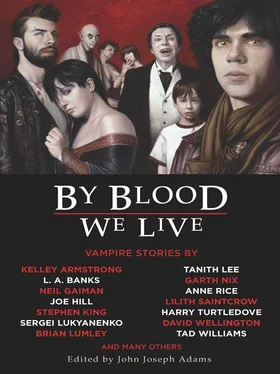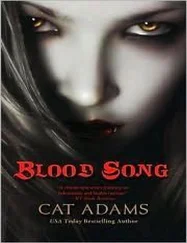“It’s five hours to London,” he whispered in my ear.
“I can wait,” I said, feeling the thirst like a fever as I held tight to him, feeling his lips against my eyelids and my hair. "I want to hunt the London streets tonight,” I confessed, a little shyly, but I saw only approbation in his eyes.
“Beautiful Julie, my Julie…” he whispered.
“You’ll love the house in Mayfair,” I said.
“Yes…” he said.
“And when Richard finally tires of Rampling Gate, we shall go home.”
Under St. Peter’s
by Harry Turtledove
Harry Turtledove—who is often referred to as the "master of alternate history"—is the Hugo Award-winning author of more than 80 novels and 100 short stories. His most recent novels are The Man with the Iron Heart , After the Downfall , Give Me Back My Legions! , and Hitler’s War . In addition to his SF, fantasy, and alternate history works, he’s also published several straight historical novels under the name H. N. Turteltaub. Turtledove obtained a Ph.D. in Byzantine history from UCLA in 1977.
Turtledove says that part of the appeal of vampire fiction is that we humans like to think we’re at the top of the food chain. "But what if we’re not?” he said. "Vampire stories also often involve immortality-as this one does-and sex-which this one doesn’t-and both of those are abiding themes to which vampires give a different slant.”
This story takes place in St. Peter’s Basilica in Vatican City—one of Christianity’s holiest sites—and tells the tale of the vampire living underneath it. It’s a difficult story to talk about without giving away the good parts. Let it suffice to say that it’s oh-so blasphemous. Say three Hail Marys and an Our Father after reading.
Incense in the air, even down here behind the doors. Frankincense and myrrh, the scents he remembered from days gone by, days when he could face the sun. Somber Latin chants. He recognized them even now, though the chanters didn’t pronounce Latin the way the legionaries had back in those bright days.
And the hunger. Always the hunger.
Would he finally feed? It had been a long time, such a very long time. He could hardly remember the last time he’d had to wait so long.
He wouldn’t die of starvation. He couldn’t die of starvation. His laughter sent wild echoes chasing one another in his chamber. No, he couldn’t very well die, not when he was already dead. But he could wish himself extinguished. He could, and he did, every waking moment-and every moment, from now to forever or the sun’s next kiss, was a waking moment.
Much good wishing did him.
He waited, and he remembered. What else did he have to do? Nothing. They made sure of it. His memory since his death and resurrection was perfect. He could bring back any day, any instant, with absolute clarity, absolute accuracy.
Much good that did him, too.
He preferred recalling the days before, the days when he was only a man. (Was he ever only a man? He knew how many would say no. Maybe they were right, but he remembered himself as man and man alone. But his memories of those days blurred and shifted-as a man’s would-so he might have been wrong. Maybe he was something else, something different, right from the start.)
He’d packed a lot into thirty-odd years. Refugee, carpenter, reformer, rebel… convict. He could still hear the thud of the hammer that drove in the spikes. He could still hear his own screams as those spikes pierced him. He’d never thought, down deep in his heart, that it would come to that-which only just went to show how much he knew.
He’d never thought, down deep in his heart, that it would come to this, either. Which, again, just went to show how much he knew.
If he were everything people said he was, would he have let it come to this? He could examine that portion of his-not of his life, no, but of his existence, with the perfect recall so very distant from mortality. He could examine it, and he had, time and again. Try as he would, he couldn’t see anything he might have done differently.
And even if he did see something like that, it was much too late to matter now.
“Habemus papam!”
When you heard the Latin acclamation, when you knew it was for you… Was there any feeling to match that, any in all the world? People said a new Orthodox Patriarch once fell over dead with joy at learning he was chosen. That had never happened on this trunk of the tree that split in 1054, but seeing how it might wasn’t hard. A lifetime of hopes, of dreams, of work, of prayer, of patience… and then, at last, you had to try to fill the Fisherman’s sandals.
They will remember me forever, was the first thought that went through his mind. For a man who, by the nature of his office, had better not have children, it was the only kind of immortality he would ever get. A cardinal could run things behind the scenes for years, could be the greatest power in the oldest continually functioning institution in the world-and, five minutes after he was dead, even the scholars in the Curia would have trouble coming up with his name.
But once you heard "Habemus papam!"…
He would have to deal with Italians for the rest of his life. He would have to smell garlic for the rest of his life. Part of him had wanted to retire when his friend, his patron, passed at last: to go back north of the Alps, to rusticate.
That was only part of him, though. The rest… He had been running things behind the scenes for years. Getting his chance to come out and do it in the open, to be noted for it, to be noticed for it, was sweet. And his fellow cardinals hadn’t waited long before they chose him, either. What greater honor was there than the approval of your own? More than anyone else, they understood what this meant. Some of them wanted it, too. Most of them wanted it, no doubt, but most of the ones who did also understood they had no chance of gaining it.
Coming out of the shadows, becoming the public face of the Church, wasn’t easy for a man who’d spent so long in the background. But he’d shown what he could do when he was chosen to eulogize his predecessor. He wrote the farewell in his own tongue, then translated it into Italian. That wasn’t the churchly lingua franca Latin had been, but still, no one who wasn’t fluent in it could reasonably hope to occupy Peter’s seat.
If he spoke slowly, if he showed Italian wasn’t his native tongue-well, so what? It gave translators around the world the chance to stay up with him. And delivering the eulogy meant people around the world saw him and learned who he was. When the College of Cardinals convened to deliberate, that had to be in the back of some minds.
He wouldn’t have a reign to match the one that had gone before, not unless he lived well past the century mark. But Achilles said glory mattered more than length of days. And John XXIII showed you didn’t need a long reign to make your mark.
Vatican II cleared away centuries of deadwood from the Church. Even the Latin of the Mass went. Well, there was reason behind that. Who spoke Latin nowadays? This wasn’t the Roman Empire any more, even if cardinals’ vestments came straight out of Byzantine court regalia.
But change always spawned a cry for more change. Female priests? Married priests? Homosexuality? Contraception? Abortion? When? Ever? The world shouted for all those things. The world, though, was a weather vane, turning now this way, now that, changeable as the breeze. The Church was supposed to stand for what was right… whatever that turned out to be.
If changes come, they’ll come because of me. If they don’t, that will also be because of me, the new Holy Father thought. Which way more than a billion people go depends on me.
Читать дальше












